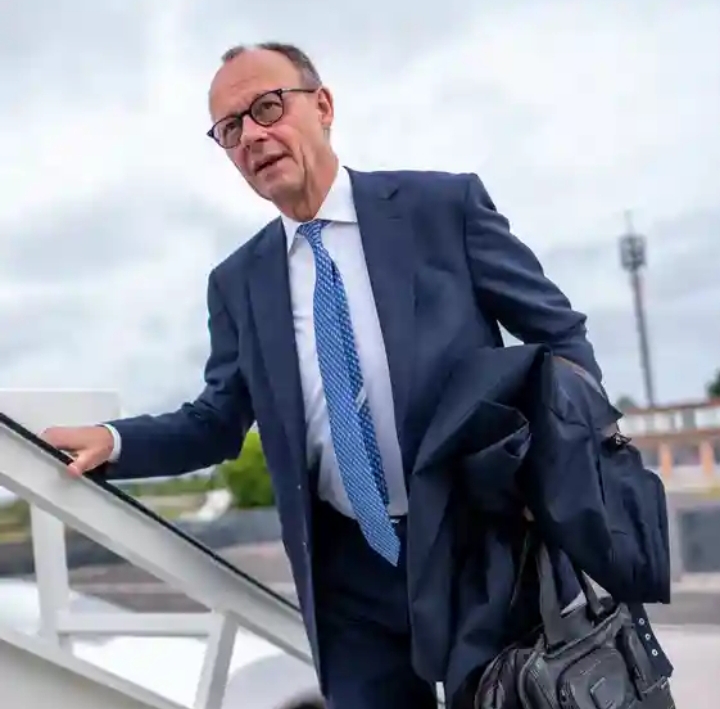Merz and Trump, familiar but meeting officially for the first time, will discuss Ukraine, trade, and European security amid cautious diplomacy and differing views.
High Hopes as Germany’s Merz Meets US President Trump


Friedrich Merz and Donald Trump have already exchanged private cell phone numbers and are on a first-name basis. However, aside from a brief encounter in New York years ago, this Thursday will mark the first official meeting between the two leaders.
The new German Chancellor, Friedrich Merz of the conservative Christian Democratic Union (CDU), is making his inaugural visit to Washington. As with former Chancellor Angela Merkel, Britain’s Queen Elizabeth, and French President Charles de Gaulle before him, Merz has been invited to stay at Blair House, located directly adjacent to the White House.
Only a few weeks ago, Merz voiced strong disapproval of events in the Oval Office in March, during which the US president publicly mocked Ukrainian President Volodymyr Zelenskyy and blamed him for Russia’s war against his own country. Merz also criticized Vice President JD Vance and other Trump allies for showing support for Germany’s far-right Alternative for Germany (AfD) party.
Recently, the German chancellor recounted to public broadcaster WDR how his first phone conversation with Donald Trump went: “It’s always important not to talk for too long, but to keep it short and also let him talk.”
According to Merz, every second or third word the president used was “great.”
“You have to adapt your approach and work with him. At the same time, we mustn’t make ourselves smaller than we are,” said Merz. “We are not supplicants.”
Carlo Masala, professor of international politics at the Bundeswehr University in Munich, also believes Merz must approach the meeting with confidence.
Masala told public broadcaster NDR: “He needs to be assertive, but at the same time make Trump feel respected as a great statesman with a strong vision. I believe that flattery combined with European self-confidence is the best strategy, although there is no guarantee that it will ultimately be successful.”
The discussions in Washington are expected to focus on three major issues: the war in Ukraine, transatlantic tariff disputes, and the question of Europe’s contribution to its own security.
On defense, Merz now has tangible progress to point to. Trump has frequently criticized some European NATO partners, including Germany, for underfunding their defense, and has even threatened to withdraw US protection. Now, Merz can highlight that Germany is planning a substantial military build-up: five percent of its GDP will be allocated to defense, with 3.5 percent going directly to the military and 1.5 percent to defense-related infrastructure.
Germany also aims to play a more prominent leadership role in Europe. The recent joint visit to Kyiv by the heads of state from Germany, France, Great Britain, and Poland — initiated by Merz — was a demonstration of Europe’s commitment to meeting American expectations of assuming greater responsibility for its own security. In return, Merz and other European leaders hope to cooperate with the United States in applying increased pressure on Russian President Vladimir Putin.
On the issue of trade tariffs, Merz holds no direct negotiating power, as trade policy falls under the European Union’s jurisdiction. Nevertheless, as a major export-driven economy, Germany is feeling the impact of protectionist trade measures. On the day of Merz’s departure, US import tariffs on European steel and aluminum doubled to 50 percent. The chancellor is expected to advocate for both sides to avoid a deepening trade conflict that would be detrimental to all parties involved.
Friedrich Merz is firmly rooted in the transatlantic tradition. He is expected to make the case to Donald Trump that continued US engagement with Europe is also in America’s interest.
However, political scientist Carlo Masala remains skeptical. “I believe that any long-term strategy that can work must assume that the United States will pull out of the negotiations between Russia and Ukraine,” he said.
Masala believes Europe must be ready for a scenario in which the US, currently Ukraine’s most important supporter, withdraws.
“And to move quickly when it comes to the question of European defense capabilities and sovereignty,” he added. “That is the long-term strategy.”
With the new federal government made up of the conservative CDU/CSU and the Social Democrats (SPD), a shift in foreign policy tone has also taken shape. Former Green Party Foreign Minister Annalena Baerbock was sometimes criticized for being moralizing and patronizing.
The current government now intends to focus more on shared interests and compromise — even with difficult partners like the Trump administration.
Although numerous conflicts exist between Germany and the US, and the two leaders differ significantly in personality and political style, Merz appears determined to pursue a candid dialogue with the American president. Following in the footsteps of former Chancellor Angela Merkel, Merz has invited Trump to visit the ancestral homeland of his family. Trump’s grandfather, Friedrich Trump, grew up in the wine-producing village of Kallstadt in the Palatinate region of Germany before emigrating to the United States.
It remains uncertain whether Trump will accept the invitation this time.

 বাংলা
বাংলা  Spanish
Spanish  Arabic
Arabic  French
French  Chinese
Chinese 
